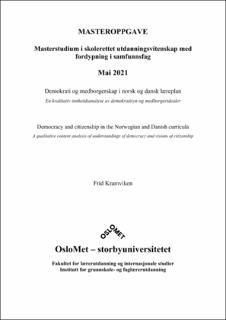| dc.contributor.advisor | Kjøstvedt, Anders Granås | |
| dc.contributor.author | Kramviken, Frid | |
| dc.date.accessioned | 2021-10-14T06:41:41Z | |
| dc.date.available | 2021-10-14T06:41:41Z | |
| dc.date.issued | 2021 | |
| dc.identifier.uri | https://hdl.handle.net/11250/2799926 | |
| dc.description.abstract | Utdanning til demokratisk medborgerskap er en viktig oppgave for skolen både i Danmark og Norge. Spesielt har samfunnsfaget en sentral rolle i å forberede elevene for deltakelse i utviklingen av samfunnet. Men hva slags syn på demokrati og medborgerskap skolen fremmer, vil ha stor innvirkning på elevenes rolle i demokratiet. Denne masteroppgaven er en del av forskningsprosjektet Democracy, Equality, Learning and Mobilisation for Future Citizens (DEMOCIT). Jeg analyserer læreplaner for Norge og Danmark med fokus på utdanning til demokratisk medborgerskap. Hovedproblemstillingen lyder som følger: Hvilke demokratisyn og medborgeridealer kommer til uttrykk i den norske og den danske læreplanen? Mine underproblemstillinger dreier seg om hvorvidt det finnes motstridende syn og idealer innad i læreplanene, om de oppfordrer til systemkritikk og i hvilken grad de legger vekt på at elevene skal utvikle politisk mestringstro. For å svare på dette har jeg gjort en kvalitativ innholdsanalyse av den gjeldende læreplanen for folkeskolen i Danmark og grunnskolen i Norge. Ulike demokratisyn og medborgeridealer danner det teoretiske grunnlaget for analysen. Gjennomføringen av analysen baserer seg på en rekke ord og formuleringer som karakteriserer de ulike typologiene. Tekstmaterialet, altså læreplanene, er tolket opp mot disse. Funnene fra analysen viser at læreplanene for både Danmark og Norge i stor grad er preget av liberale tendenser og individuelt orienterte medborgeridealer. Utvikling av individuell kunnskap, egenskaper og ferdigheter gjenspeiles i omtrent alle deler av læreplanene, spesielt i kompetansemålene. Dette gjør også at det ikke i særlig stor grad legges til rette for utvikling av politiske mestringstro, selv om den danske læreplanen i noe større grad fokuserer på dette enn den norske. Likevel er det viktig å påpeke at de andre perspektivene også forekommer, og i noen deler av læreplanene er de tydelig representert. Men hovedtendensen er likevel at det sosiale og kritiske aspektet er mindre representert enn den individuelle kunnskapstilegnelsen. En tendens er at overordnede deler av den norske læreplanen, og formålsparagrafen og undervisningsveiledningen i Danmark, er noe mer idealistisk enn kompetansemålene. | en_US |
| dc.description.abstract | Education for democratic citizenship is an important task for the schools in both Denmark and Norway. The social sciences have a particularly central role in preparing students for participation in the development of society. But what kind of understandings of democracy and citizenship the schools promote will have a great impact on the students’ role in the democracy. This master´s thesis is part of the research project Democracy, Equality, Learning and Mobilization for Future Citizens (DEMOCIT). I analyze curricula for Norwegian and Danish schools with a focus on education for democratic citizenship. The main research question is as follows: What understandings of democracy and visions of citizenship are expressed in the Norwegian and Danish curricula? My secondary questions of research focus on whether there is conflicting understandings and visions within the curricula, whether they encourage system criticism and to what extent they emphasize that students should develop political efficacy. To answer these questions, I am doing a qualitative content analysis of the current curriculum for the schools in Norway and Denmark. The different understandings of democracy and visions of citizenship form the theoretical basis for the analysis. The analysis is based on a number of words and formulations that characterize the different typologies. The text material is interpreted in relation to the typologies. The findings from the analysis show that the curricula for both Denmark and Norway are largely characterized by liberal tendencies and individually oriented visions of citizenship. Individual knowledge and skills are reflected in almost all parts of the curricula, especially in the competence goals. This also means that the development of political efficacy is not facilitated to any great extent, even though the Danish curriculum focuses on this to a somewhat greater extent than the Norwegian curriculum. Nevertheless, it is important to point out that the other understandings and visions also occur, and in some parts, they are clearly represented. But the main tendency is still that the social and critical aspects are less represented than the individual acquisition of knowledge. There is a tendency that the general parts of the Norwegian curriculum, and the objectives clause and teaching guidance in Denmark, is somewhat more idealistic than the competence goals. | en_US |
| dc.language.iso | nob | en_US |
| dc.publisher | OsloMet - Storbyuniversitetet | en_US |
| dc.subject | Demokratisk medborgerskap | en_US |
| dc.subject | Læreplananalyser | en_US |
| dc.subject | Demokratisyn | en_US |
| dc.subject | Medborgeridealer | en_US |
| dc.subject | Fagfornyelser | en_US |
| dc.subject | Fælles mål | en_US |
| dc.title | Demokrati og medborgerskap i norsk og dansk læreplan - En kvalitativ innholdsanalyse av demokratisyn og medborgeridealer | en_US |
| dc.title.alternative | Democracy and citizenship in the Norwegian and Danish curricula - A qualitative content analysis of understandings of democracy and visions of citizenship | en_US |
| dc.type | Master thesis | en_US |
| dc.description.version | publishedVersion | en_US |
| dc.source.pagenumber | 102 | en_US |
| dc.subject.nsi | VDP::Samfunnsvitenskap: 200::Pedagogiske fag: 280::Fagdidaktikk: 283 | en_US |
